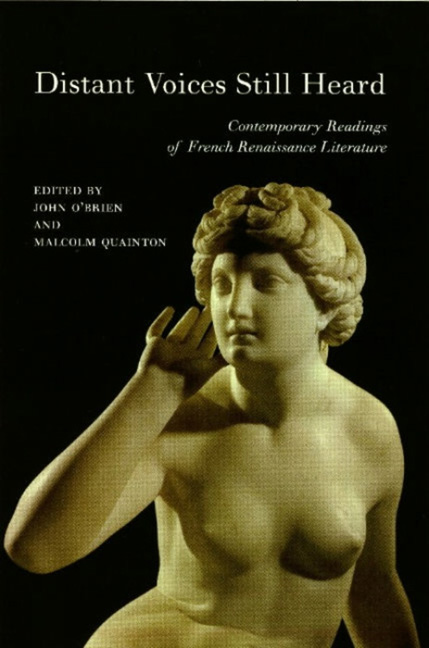Book contents
- Frontmatter
- Contents
- Editors’ Foreword
- Introduction: The Time of Theory
- 1 The Highs and Lows of Structuralist Reading: Rabelais, Pantagruel, chapters 10—13
- 2 Rabelais’ Strength and the Pitfalls of Methodology: Tiers Livre, chapters 7–18
- 3 ‘Blond chef, grande conqueste’: Feminist Theories of the Gaze, the blason anatomique and Louise Labé's Sonnet 6
- 4 Louise Labé's Feminist Poetics
- 5 Reading and Writing in the Tenth Story of the Heptaméron
- 6 Fetishism and Storytelling in Nouvelle 57 of Marguerite de Navarre's Heptaméron
- 7 Creative Choreography: Intertextual Dancing in Ronsard's Sonnets pour Hélène: II, 30
- 8 An Overshadowed Valediction: Ronsard's Dedicatory Epistle to Villeroy
- 9 ‘De l'amitié’ (Essais 1.28): ‘Luy’ and ‘Moy’
- 10 Montaigne's Death Sentences: Narrative and Subjectivity in ‘De la diversion’ (Essais 3.4)
- Select Bibliography
- Index
9 - ‘De l'amitié’ (Essais 1.28): ‘Luy’ and ‘Moy’
- Frontmatter
- Contents
- Editors’ Foreword
- Introduction: The Time of Theory
- 1 The Highs and Lows of Structuralist Reading: Rabelais, Pantagruel, chapters 10—13
- 2 Rabelais’ Strength and the Pitfalls of Methodology: Tiers Livre, chapters 7–18
- 3 ‘Blond chef, grande conqueste’: Feminist Theories of the Gaze, the blason anatomique and Louise Labé's Sonnet 6
- 4 Louise Labé's Feminist Poetics
- 5 Reading and Writing in the Tenth Story of the Heptaméron
- 6 Fetishism and Storytelling in Nouvelle 57 of Marguerite de Navarre's Heptaméron
- 7 Creative Choreography: Intertextual Dancing in Ronsard's Sonnets pour Hélène: II, 30
- 8 An Overshadowed Valediction: Ronsard's Dedicatory Epistle to Villeroy
- 9 ‘De l'amitié’ (Essais 1.28): ‘Luy’ and ‘Moy’
- 10 Montaigne's Death Sentences: Narrative and Subjectivity in ‘De la diversion’ (Essais 3.4)
- Select Bibliography
- Index
Summary
Contemporary Readings is an ambivalent subtitle for a book of essays, and this reading of an essay by Montaigne is suitably ambivalent. It is a ‘contemporary reading’ in the sense that it will try to indicate reading routes that would have been familiar to Montaigne's contemporaries. But no modern reader is Montaigne's contemporary in that sense. If only because of the strangeness of Montaigne's language, a ‘contemporary reading’, in the sense of ‘modern reading’, starts necessarily from an awareness of the historical distance which separates us from his contemporary readers. The original readers of the Essais were invited to pick their way through them by reading signs different from those we are used to. ‘Different’ but not unintelligble. The purpose of the present essay on ‘De l'amitié’ is to make those signs legible, and so to constitute a dialogue between past and present ‘contemporaries’.
The reason why ‘De l'amitié’ seems an appropriate stage for such a dialogue is because in it we can hear Montaigne's own dialogue with the dead. His dead friend belongs to an irrecoverable past, more at one now with those who spoke the dead languages of admired Antiquity than with Montaigne's contemporary present. ‘De l'amitié’ attempts to put in place a complex set of dialogues over that space of time. In the attempt Montaigne both finds his own singular voice and constructs a cultural modernity from contemporary strategies of discourse. It is those strategies, recognisable to his contemporaries but not always to us, that my essay aims to uncover, bringing us nearer perhaps to the process of writing as it was then. Even so, modern readers can do no more than attune their ears to long defunct patterns of speech. We still find ourselves listening from an unbridgeable distance, a distance as unbridgeable as that which Montaigne ultimately saw between himself and his own dead past, and between himself and the Antiquity in whose image he had been formed. Yet it was precisely by reading that distance from the perspective of his present that Montaigne found himself and spoke so forcibly to his contemporaries. It is also by adopting the language of their contemporaries that modern readers may find themselves enabled to read signs pointing towards other productive forms of dialogue with the past.
- Type
- Chapter
- Information
- Distant Voices Still HeardContemporary Readings of French Renaissance Literature, pp. 185 - 201Publisher: Liverpool University PressPrint publication year: 2000



